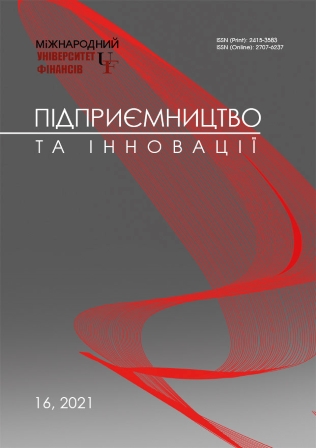EUROPEAN INTEGRATION AS A FACTOR IN THE DEVELOPMENT OF TRANSPORT AND LOGISTIC CLUSTERS IN UKRAINE
Abstract
The article considers the prospects of clustering of transport and logistics system of Ukraine, analyzes the main characteristics of transport and logistics clusters, forms the paradigm of state regulation of transport and logistics clusters and identifies and justifies its need, especially at the cluster development stage, identifies basic tools of state support. In order to determine the effectiveness of economic clustering processes, the experience of European countries in the creation and operation of transport and logistics clusters is considered, their importance for clustering of the whole economy is determined, features, internal and external factors, mechanisms and drivers of transport and logistics clusters of different types are systematized. the most promising European areas for the development of transport and logistics clustering, namely the area of "Blue" and "Golden Banana". It is determined that this region has good prospects for further development, is extremely attractive for large investments, which contributes to the expansion of the "banana" zone, we can predict that in the near future we will see the growth and integration of these zones. These trends significantly intensify the socio-economic development of countries that are part of the "banana" zone. Transport and logistics clusters are considered in terms of regional reproduction and increase the efficiency of all other clusters by creating a reliable framework for transportation of products and logistics services. Lack, insufficient capacity, low efficiency of transport and logistics clusters determines the low level of socio-economic development of the country and the separation of the region from global integration processes, the loss of geopolitical and geostrategic influence. Powerful transport and logistics clusters are able to significantly increase the transit potential of the region, improve the quality of life, revive investment activity, reduce unemployment, improve staff skills, promote innovation in the development of the region, increase budget revenues and budgets at various levels. . It is proposed to accelerate the process of intensifying the development of troubled markets and regions of Ukraine through the creation of transport and logistics clusters, which will be the basis for the overall clustering of Ukraine's economy.
References
Портер М.Э. Конкуренция / пер. с англ. Москва : Вильямс, 2005. 608 с.
Swann, G.M.P. and Prevezer, M. (1996) A Comparison of the Dynamics of Industrial Clustering in Computing and Biotechnology, Research Policy 25, pp. 1139-1157.
Мандра В.В. Аналіз світового досвіду управління транспортно-логістичним центром. Економічний аналіз. 2016. Т. 24. № 2. С. 92–97.
Смирнов І., Шматок О. Формування транспортно-логістичних кластерів у ЄС: український контекст. Вісник Київського національного університету імені Т.Г. Шевченка. 2012. Вип. 60. С. 14–19.
European Alternative Fuels Observatory : web-site. URL: https://www.eafo.eu/alternative-fuels/electricity/charging-infra-stats (дата звернення: 21.02.2021).
Тарнавська Н.П., Сивак Р.Б. Організаційні та інфраструктурні передумови створення міжнародного логістичного центру. Бізнес Інформ. 2013. № 13. С. 29–35.
Porter M. (2005) Konkurentsiya [Competition]. Moscow: Williams. (in Russian)
Swann G.M.P., Prevezer M. (1996) A Comparison of the Dynamics of Industrial Clustering in Computing and Biotechnology. Research Policy 25, pp. 1139-1157.
Mandra V. V. (2016) Analiz svitovogho dosvidu upravlinnja transportno-loghistychnym centrom [Analysis of world experience in transport and logistics center management]. Ekonomichnyj analiz : zb. nauk. pracj. Ternopilj : Vydavnycho-polighrafichnyj centr Ternopiljsjkogho nacionaljnogho ekonomichnogho universytetu “Ekonomichna dumka”,vol. 24, no. 2, pp. 92–97.
Smyrnov I., Shmatok O. (2012) Formuvannja transportno-loghistychnykh klasteriv u JeS: ukrajinsjkyj kontekst [Formation of transport and logistics clusters in the EU: Ukrainian context]. Bulletin of the Kiev National University Shevchenko, vol. 60, pp. 14-19.
European Alternative Fuels Observatory. URL: https://www.eafo.eu/alternative-fuels/electricity/charging-infra-stats (accessed 21 February 2021).
Tarnavsjka N. P., Syvak R. B. (2013) Orghanizacijni ta infrastrukturni peredumovy stvorennja mizhnarodnogho loghistychnogho centru [Organizational and infrastructure prerequisites for the creation of an international logistics center]. Biznes–Inform, no. 13, pp. 29–35.



